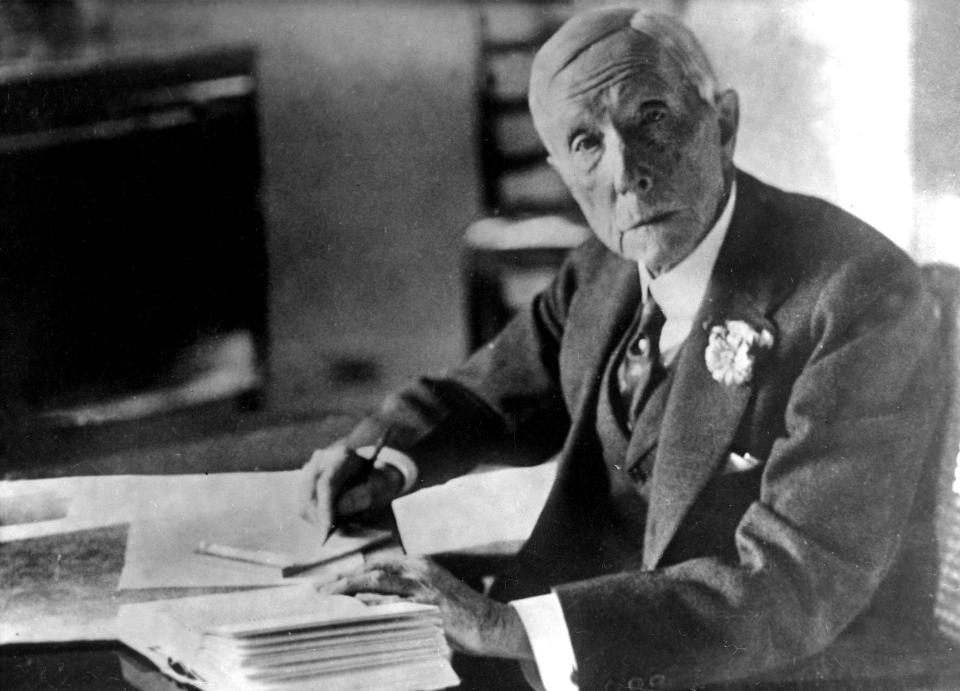The potential investor upside of a Google breakup — if John Rockefeller is any guide

Google's (GOOG, GOOGL) legal troubles could force it to sell off some of its prized businesses, but investors worried about that outcome may find some comfort in what happened to John Rockefeller’s Standard Oil more than a century ago.
The empire that controlled nearly all US oil production during America’s industrial revolution had to split into 34 smaller companies after the Supreme Court in 1911 sided with the Justice Department in an antitrust challenge.
The divestiture of those companies made Rockefeller the richest man in the world. But it also made other shareholders in those new companies richer too, according to legal experts.
The companies became giants such as Chevron (CVX) and Exxon Mobil (XOM) that still rule the industry today.
“[T]he market cap total for all those companies increased about five- to six-fold based on what the valuation was thought for Standard Oil,” said Boston College Law School antitrust law professor David Olson.
New management and efficiencies that followed the breakup helped the smaller companies flourish, added Susman Godfrey antitrust litigation attorney Barry Barnett.
In the case of Google, existing shareholders may benefit as a scaled-back company tends to boost innovation and customer service, Barnett said. Google's search engine, for example, could start producing more relevant results and become more valuable to advertisers.
"The people who own the company are not going to lose," Barnett said.
Not everyone agrees with this rosy view. One analyst at Evercore ISI recently reduced a price target on Alphabet, Google’s parent company, after rereading a federal judge’s landmark US antitrust ruling against the company handed down in August.
US District Court Judge Amit Mehta, who decided the case, sided with the US Justice Department’s claims that Google’s Search business was an illegal monopoly that it abused to keep rivals at bay.
Mehta also agreed with the DOJ’s accusations that Google illegally monopolized the market for online search text advertising.
"[W]e believe a ‘worst case’ scenario is a more likely scenario than the market assumes," Evercore’s analyst wrote in the note.
It is not yet known what remedies the judge may approve as a result of his ruling.
They could range from an outright breakup of Google to forcing the company to make its search engine data, its "index," available to competitors.
It could also be forced to end the types of agreements that got Google into trouble with regulators, that secure its search engine as a default on mobile devices and internet browsers.
George Alan Hay, Cornell University law and economics professor and former DOJ antitrust division chief, said the DOJ is likely to request “some form of divestiture” where Google is found to have violated the law.
"It would be significant. It wouldn’t be backbreaking," he said. "Google could survive."
One concern for stockholders is that a breakup could affect Google’s huge profit engine. In 2023, Google Search generated more than $175 billion in revenue.
Coupled with Google's YouTube ads and Google network revenue, both of which it promotes on its general search engine, advertising on the platforms accounted for a staggering $237 billion of the company's $307 billion in total revenue.
In October 2020, when the DOJ and states filed suit, Google's annual revenue was roughly half of that, totaling $162 billion.
Not all breakups of business empires have led to positive results, at least in the immediate aftermath.
Consider the breakup of the AT&T (T) telecom network in the 1980s that followed seven years of litigation with the DOJ.
The Justice Department sued AT&T in 1974, seeking a breakup of its phone service and phone equipment monopolies. It got most of what it wanted in 1984 following a 1982 settlement that created a number of regional companies.
But AT&T lost significant long-distance revenue to newcomers MCI and Sprint. From 1984 to 1996, its share of total long-distance revenue fell from 91% to 48%.
But Barnett said he expects a breakup of Google to impact its shareholders the way that Standard Oil's breakup did.
"So if you're an Alphabet shareholder, this may be good for you."
Alexis Keenan is a legal reporter for Yahoo Finance. Follow Alexis on X @alexiskweed.
Click here for the latest technology news that will impact the stock market
Read the latest financial and business news from Yahoo Finance
Breaking news
See all






